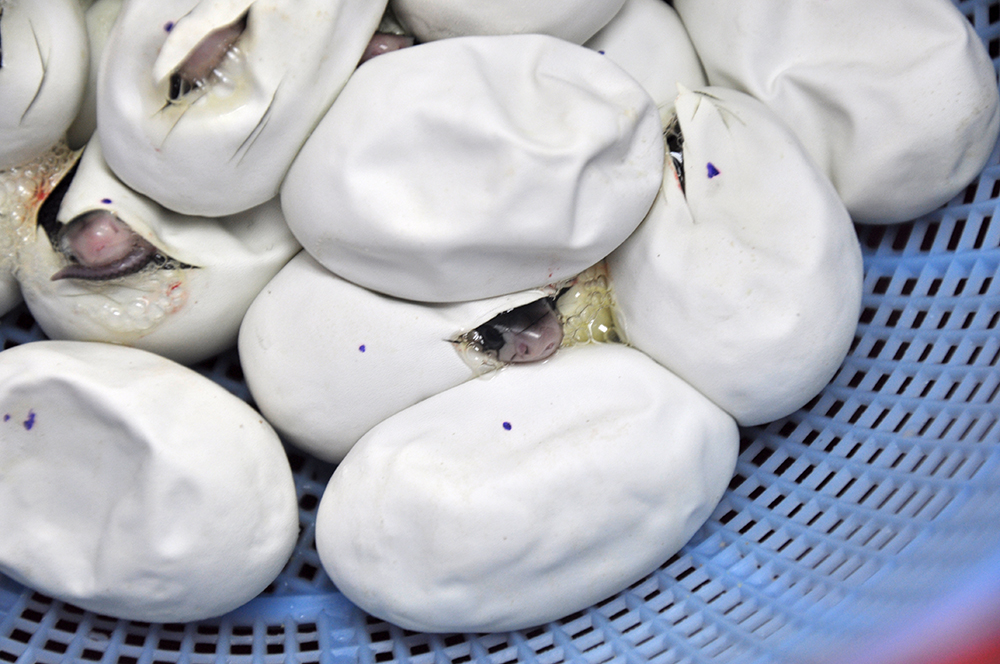
Snake Farm
Snake Farm
Snake Farm Research
Snake farm has responded for several researches include venomous snakes, venom biochemistry, snake biology, pathology and snake husbandry and cooperate several researches with Research and Development department or institute for both in Thailand and other countries.
- Snake husbandry
In 1994, a captive breeding program for venomous Thai snakes was established at the Queen Saovabha Memorial. This was necessary to secure a stable, healthy and species confirmed source of snake venom for antivenom production. This program continued until 2008 and fulfil in breeding for many snake species and training for alternate food.

- Venom biochemistry
Venom composition and potency are studied for basic knowledge lead to understanding of venom toxicity which guide to improve antivenom production and snake bites treatment. Molecular biology has been developed in venom study in cooperate with faculty of medicine, Chulalongkorn university and university in Japan, this study gain sequence of nucleic acids and amino acids of enzymes and toxins in snake venoms such as phospholipase A2 of
Daboia russelii siamensisandBungarus candidus, neurotoxin ofBungarus candidusand Bradykinin-potentiating peptide ofCalloselasma rhodostoma. Moreover, role of alternate food that influence to compositions and properties of venom is studied.
- Inhibiting ability of herbs
Inhibiting ability of herbs to venom of
Naja kaouthiaandCalloselasma rhodostomaare studied in cooperate with faculty of Pharmaceutical Science, Mahidol university and Songkla Nakharin university. This study shows degree of venom inhibition from many herbs in vitro and still continued to improve for clinical use especially for local damges.
- Snake biology
Studying of basic biology and physiology of snakes which help to understand basic function and requirement of snake for improve efficiency of snake husbandry. Such as studying of water turn over in
Naja kaouthiaandPython reticulatus, snakes normal blood chemistry profile, role of food and environment to blood chemistry.
- Studying on cross reaction of QSMI antivenom
There are 56 species of venomous snakes in Thailand but antivenoms are available for 7 species that important in public health. Therefore, studying of cross reactivity and cross protection of antivenoms are necessary to medical advances in order to be alternative to snake bites treatment.
- Infectious diseases and pathology of snakes
Infectious diseases and pathology of snakes are studied in cooperate with faculty of Veterinary Scince, Chulalogkorn university and Kasetsart university for diagnosis, treatment and prevention of disease s that decline morbidity and mortality rate in snakes and improve production from snakes.
- Adapted from: Book of Snake farm, Queen Saovabha Memorial Institute.
- References :
1. Jintakun, P. and Chanhome, L. (1995). Snakes of Thailand. Queen Saovhbha Memorial Institute, Bangkok.
2. Cox, M.J., van Dijk, P.P., Nabhitabhata, J., and Thirakhupt, K. (1998). A photographic guide to snakes and other reptiles of Thailand and South-east Asia. Asia books, Bangkok.
3. David, P. and Ineich, I. (1999). Les serpents venimeux du monde : systèmatique et repartition. Dumerilia 3
4. Whitaker, R. and Captain, A. (2004). Snakes of India, The Field Guide. Hyderabad, India
